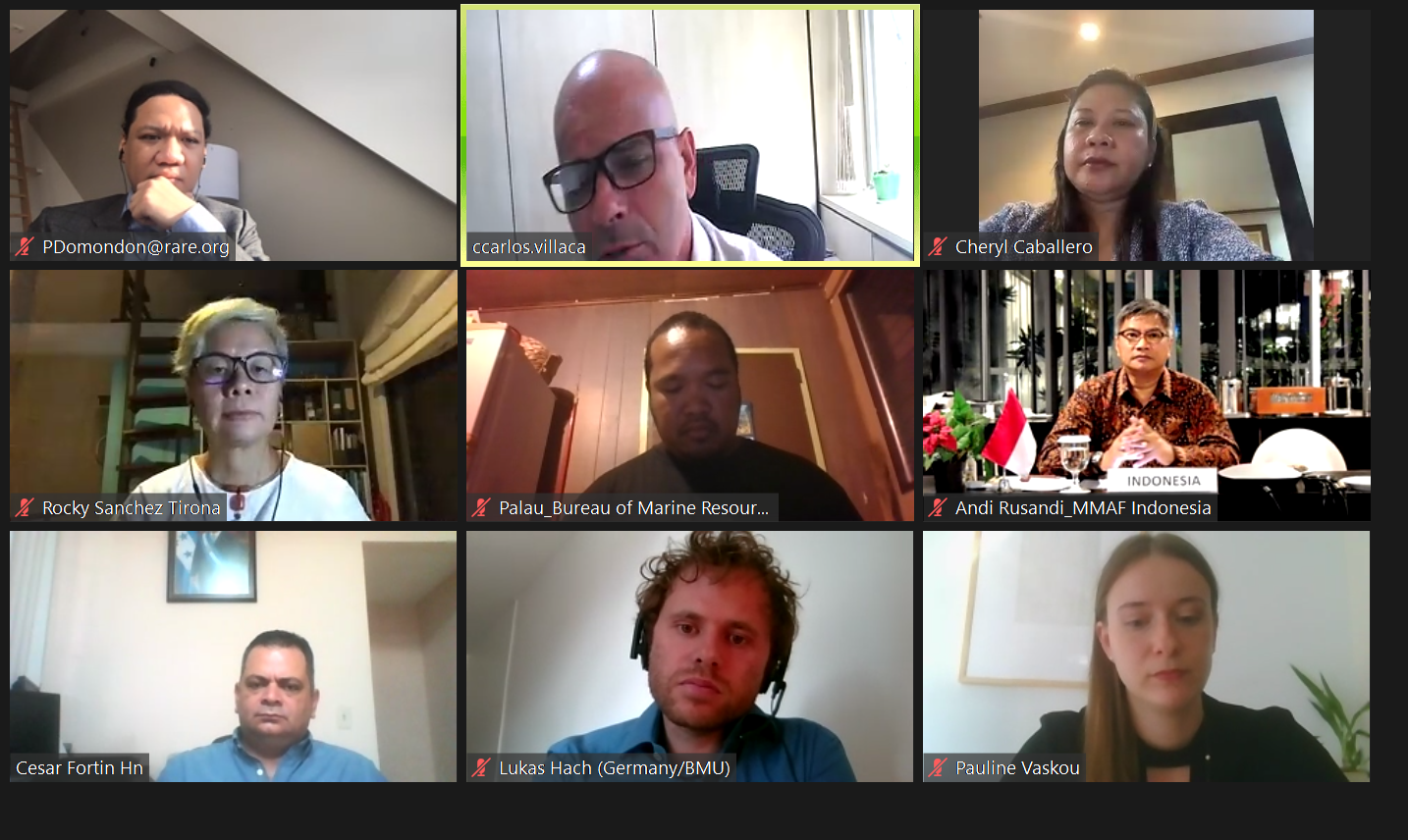Arlington, VA – Today, high-level officials representing the governments of six coastal nations committed to protecting and conserving coastal and marine ecosystems and sustaining local fisheries as they work toward a Green Recovery from the COVID-19 pandemic. The officials representing Brazil, Honduras, Indonesia, Mozambique, Palau and the Philippines met for a roundtable discussion at the margins of the 75th UN General Assembly and Climate Week NYC, the largest international climate summit this year. The roundtable was facilitated by international conservation NGO, Rare. During the roundtable, the representatives reiterated the important contributions small-scale fisheries make to food security, nutrition, the local economies of coastal nations, and enhanced coastal resilience from climate change.
“We commit to finding ways to make our countries recovery greener so that we are strengthening our coastal communities’ resilience and continuing to support the vital role that the sector plays,” said the officials in a joint message released following the event.

Rare’s Fish Forever coastal fisheries program operates in each of the represented nations. The roundtable is the first time that high-level officials from each of the countries have come together to discuss efforts around the protection and sustainable management of the coastal and fisheries resources. During the roundtable, officials shared experiences from the global COVID-19 pandemic, lessons learned, and solutions implemented for building the resilience of coastal communities and small-scale fisheries to withstand impacts of climate change.
“Today’s meeting signals significant momentum for granting small-scale fisheries the recognition they deserve for their role as a social safety net for coastal nations, particularly in times of crisis,” said Rare’s Steve Box, Managing Director of Fish Forever. “Rare applauds these nations for leading the way in ensuring that small-scale fishers and the network of microenterprises around them are fully recognized as foundational to the rural economy and a sustained recovery, as well as improving climate resilience. With the impact of COVID likely to linger for the foreseeable future, we must secure these livelihoods and safeguard the resources communities depend on for sustainable growth.”
Event participants also included representatives from Bloomberg Philanthropies and the German Federal Ministry for the Environment, Nature Conservation, and Nuclear Safety, who commended the counties’ efforts to secure sustainable small-scale fisheries during the global pandemic, as well as their effort to come together, learn from one another, and share best practices.
The officials’ joint message is below:
Coastal Communities and Small-Scale Fisheries During the Global Pandemic
We, the representatives of coastal nations who recognize the importance of our small-scale fisheries, met in a virtual forum on September 22, 2020, for the first-ever roundtable discussion on improving the resilience of coastal communities as part of a green recovery to COVID-19.
We all share the goals of protecting and conserving coastal and marine ecosystems, sustaining local fisheries, and ensuring the livelihoods and prosperity of our communities. We hope our collective leadership serves as a motivating force, and through the sharing of knowledge and solutions, we can collectively address the shared challenges that face our coastal waters.
COVID-19 impacted every part of our nations’ productive sectors and service industries. For coastal communities, these disruptions present both immediate and long-term challenges. We recognize fishing is an essential safety net to households during this crisis, providing food and employment, and we see an increasing number of people relying on this sector as other economic opportunities have contracted. Yet we also recognize that we must balance the immediate needs with long term sustainability.
During these difficult times, we recall the contribution and critical role that coastal communities and their small-scale fisheries play –
- in ensuring local and global food security;
- in supporting the local economy and livelihoods;
- in safeguarding important marine habitats and ecosystems;
- in strengthening social and ecological resilience;
- in achieving international and national ambitions around the Sustainable Development Goals or SDGs, including SDG Goals 2 (Zero Hunger), 13 (Climate Action), and 14 (Life Below Water); and
- in implementing the Voluntary Guidelines for Securing Sustainable Small-Scale Fisheries.
We, therefore, encourage the continuation of our individual and collective efforts around protection and sustainable management of the coastal and fisheries resources.
We recognize how nature-based actions in coastal communities and the small-scale fisheries sector need to be mainstreamed in relevant COVID-19 recovery packages, as well as in development plans and climate change adaptation strategies .
We commit to finding ways to make our countries recovery greener so that we are strengthening our coastal communities’ resilience and continuing to support the vital role that the sector plays.
Signed by:
Mr. Carlos Eduardo Villaça, Director of Aquaculture and Fisheries Registration and Monitoring Department, Secretariat of Aquaculture and Fisheries, Ministry of Agriculture, Livestock and Supply, Brazil
Ing. César Fortín, Director General, General Directorate for Fisheries and Aquaculture (DIGEPESCA), Secretaría de Agricultura y Ganadería (SAG)/ Ministry of Agriculture and Livestock, Honduras
Mr. Andi Rusandi, Director, Marine Conservation and Biodiversity on behalf of Director General for Marine Spatial Management, Ministry of Marine Affairs and Fisheries, Indonesia
Mr. Cassamo Hassane Cassamo Junior, Deputy General Director, National Fisheries Administration, Ministry of the Sea, Inland Waters and Fisheries, Mozambique
Mr. Leon Remengesau, Director, Bureau of Marine Resources, Ministry of Natural Resources, Environment and Tourism, Palau
Ms. Cheryl Marie Natividad-Caballero, Undersecretary and Concurrent Chief of Staff, Department of Agriculture, Philippines
###